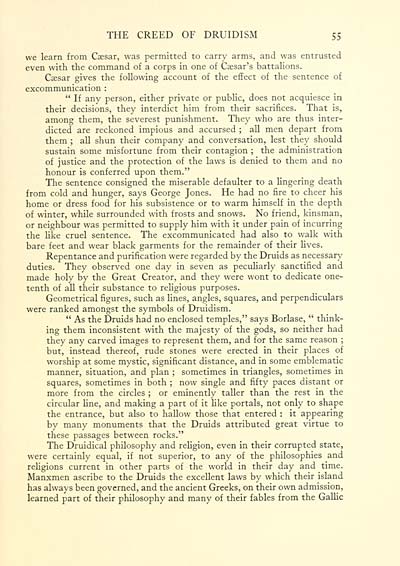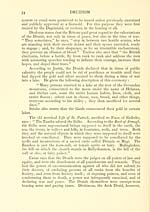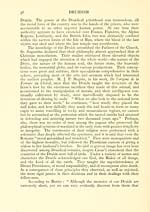Ossian Collection > Druidism
(77)
Download files
Complete book:
Individual page:
Thumbnail gallery: Grid view | List view

THE CREED OF DRUIDISM 55
we learn from Caesar, was permitted to carry arms, and was entrusted
even with the command of a corps in one of Cesar's battalions.
Cffisar gives the following account of the effect of the sentence of
excommunication :
" If any person, either private or public, does not acquiesce in
their decisions, they interdict him from their sacrifices. That is,
among them, the severest punishment. They who are thus inter-
dicted are reckoned impious and accursed ; all men depart from
them ; all shun their company and conversation, lest they should
sustain some misfortune from their contagion ; the administration
of justice and the protection of the laws is denied to them and no
honour is conferred upon them."
The sentence consigned the miserable defaulter to a lingering death
from cold and hunger, says George Jones. He had no fire to cheer his
home or dress food for his subsistence or to warm himself in the depth
of winter, while surrounded with frosts and snows. No friend, kinsman,
or neighbour was permitted to supply him with it under pain of incurring
the like cruel sentence. The excommunicated had also to walk with
bare feet and wear black garments for the remainder of their lives.
Repentance and purification were regarded by the Druids as necessary
duties. They observed one day in seven as peculiarly sanctified and
made holy by the Great Creator, and they were wont to dedicate one-
tenth of all their substance to religious purposes.
Geometrical figures, such as lines, angles, squares, and perpendiculars
were ranked amongst the symbols of Druidism.
" As the Druids had no enclosed temples," says Borlase, " think-
ing them inconsistent with the majesty of the gods, so neither had
they any carved images to represent them, and for the same reason ;
but, instead thereof, rude stones were erected in their places of
worship at some mystic, significant distance, and in some emblematic
manner, situation, and plan ; sometimes in triangles, sometimes in
squares, sometimes in both ; now single and fifty paces distant or
more from the circles ; or eminently taller than the rest in the
circular line, and making a part of it hke portals, not only to shape
the entrance, but also to hallow those that entered : it appearing
by many monuments that the Druids attributed great virtue to
these passages between rocks."
The Druidical philosophy and religion, even in their corrupted state,
were certainly equal, if not superior, to any of the philosophies and
religions current in other parts of the world in their day and time.
Manxmen ascribe to the Druids the excellent laws by which their island
has always been governed, and the ancient Greeks, on their own admission,
learned part of their philosophy and many of their fables from the Gallic
we learn from Caesar, was permitted to carry arms, and was entrusted
even with the command of a corps in one of Cesar's battalions.
Cffisar gives the following account of the effect of the sentence of
excommunication :
" If any person, either private or public, does not acquiesce in
their decisions, they interdict him from their sacrifices. That is,
among them, the severest punishment. They who are thus inter-
dicted are reckoned impious and accursed ; all men depart from
them ; all shun their company and conversation, lest they should
sustain some misfortune from their contagion ; the administration
of justice and the protection of the laws is denied to them and no
honour is conferred upon them."
The sentence consigned the miserable defaulter to a lingering death
from cold and hunger, says George Jones. He had no fire to cheer his
home or dress food for his subsistence or to warm himself in the depth
of winter, while surrounded with frosts and snows. No friend, kinsman,
or neighbour was permitted to supply him with it under pain of incurring
the like cruel sentence. The excommunicated had also to walk with
bare feet and wear black garments for the remainder of their lives.
Repentance and purification were regarded by the Druids as necessary
duties. They observed one day in seven as peculiarly sanctified and
made holy by the Great Creator, and they were wont to dedicate one-
tenth of all their substance to religious purposes.
Geometrical figures, such as lines, angles, squares, and perpendiculars
were ranked amongst the symbols of Druidism.
" As the Druids had no enclosed temples," says Borlase, " think-
ing them inconsistent with the majesty of the gods, so neither had
they any carved images to represent them, and for the same reason ;
but, instead thereof, rude stones were erected in their places of
worship at some mystic, significant distance, and in some emblematic
manner, situation, and plan ; sometimes in triangles, sometimes in
squares, sometimes in both ; now single and fifty paces distant or
more from the circles ; or eminently taller than the rest in the
circular line, and making a part of it hke portals, not only to shape
the entrance, but also to hallow those that entered : it appearing
by many monuments that the Druids attributed great virtue to
these passages between rocks."
The Druidical philosophy and religion, even in their corrupted state,
were certainly equal, if not superior, to any of the philosophies and
religions current in other parts of the world in their day and time.
Manxmen ascribe to the Druids the excellent laws by which their island
has always been governed, and the ancient Greeks, on their own admission,
learned part of their philosophy and many of their fables from the Gallic
Set display mode to: Large image | Transcription
Images and transcriptions on this page, including medium image downloads, may be used under the Creative Commons Attribution 4.0 International Licence unless otherwise stated. ![]()
| Early Gaelic Book Collections > Ossian Collection > Druidism > (77) |
|---|
| Permanent URL | https://digital.nls.uk/78950400 |
|---|
| Description | Selected books from the Ossian Collection of 327 volumes, originally assembled by J. Norman Methven of Perth. Different editions and translations of James MacPherson's epic poem 'Ossian', some with a map of the 'Kingdom of Connor'. Also secondary material relating to Ossianic poetry and the Ossian controversy. |
|---|
| Description | Selected items from five 'Special and Named Printed Collections'. Includes books in Gaelic and other Celtic languages, works about the Gaels, their languages, literature, culture and history. |
|---|

